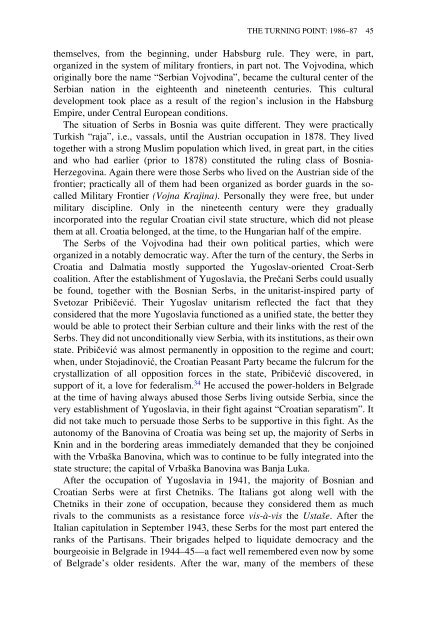Yugoslavia: A History of its Demise - Indymedia
Yugoslavia: A History of its Demise - Indymedia
Yugoslavia: A History of its Demise - Indymedia
You also want an ePaper? Increase the reach of your titles
YUMPU automatically turns print PDFs into web optimized ePapers that Google loves.
THE TURNING POINT: 1986–87 45<br />
themselves, from the beginning, under Habsburg rule. They were, in part,<br />
organized in the system <strong>of</strong> military frontiers, in part not. The Vojvodina, which<br />
originally bore the name “Serbian Vojvodina”, became the cultural center <strong>of</strong> the<br />
Serbian nation in the eighteenth and nineteenth centuries. This cultural<br />
development took place as a result <strong>of</strong> the region’s inclusion in the Habsburg<br />
Empire, under Central European conditions.<br />
The situation <strong>of</strong> Serbs in Bosnia was quite different. They were practically<br />
Turkish “raja”, i.e., vassals, until the Austrian occupation in 1878. They lived<br />
together with a strong Muslim population which lived, in great part, in the cities<br />
and who had earlier (prior to 1878) constituted the ruling class <strong>of</strong> Bosnia-<br />
Herzegovina. Again there were those Serbs who lived on the Austrian side <strong>of</strong> the<br />
frontier; practically all <strong>of</strong> them had been organized as border guards in the socalled<br />
Military Frontier (Vojna Krajina). Personally they were free, but under<br />
military discipline. Only in the nineteenth century were they gradually<br />
incorporated into the regular Croatian civil state structure, which did not please<br />
them at all. Croatia belonged, at the time, to the Hungarian half <strong>of</strong> the empire.<br />
The Serbs <strong>of</strong> the Vojvodina had their own political parties, which were<br />
organized in a notably democratic way. After the turn <strong>of</strong> the century, the Serbs in<br />
Croatia and Dalmatia mostly supported the Yugoslav-oriented Croat-Serb<br />
coalition. After the establishment <strong>of</strong> <strong>Yugoslavia</strong>, the Prečani Serbs could usually<br />
be found, together with the Bosnian Serbs, in the unitarist-inspired party <strong>of</strong><br />
Svetozar Pribičević. Their Yugoslav unitarism reflected the fact that they<br />
considered that the more <strong>Yugoslavia</strong> functioned as a unified state, the better they<br />
would be able to protect their Serbian culture and their links with the rest <strong>of</strong> the<br />
Serbs. They did not unconditionally view Serbia, with <strong>its</strong> institutions, as their own<br />
state. Pribičević was almost permanently in opposition to the regime and court;<br />
when, under Stojadinović, the Croatian Peasant Party became the fulcrum for the<br />
crystallization <strong>of</strong> all opposition forces in the state, Pribičević discovered, in<br />
support <strong>of</strong> it, a love for federalism. 34 He accused the power-holders in Belgrade<br />
at the time <strong>of</strong> having always abused those Serbs living outside Serbia, since the<br />
very establishment <strong>of</strong> <strong>Yugoslavia</strong>, in their fight against “Croatian separatism”. It<br />
did not take much to persuade those Serbs to be supportive in this fight. As the<br />
autonomy <strong>of</strong> the Banovina <strong>of</strong> Croatia was being set up, the majority <strong>of</strong> Serbs in<br />
Knin and in the bordering areas immediately demanded that they be conjoined<br />
with the Vrbaška Banovina, which was to continue to be fully integrated into the<br />
state structure; the capital <strong>of</strong> Vrbaška Banovina was Banja Luka.<br />
After the occupation <strong>of</strong> <strong>Yugoslavia</strong> in 1941, the majority <strong>of</strong> Bosnian and<br />
Croatian Serbs were at first Chetniks. The Italians got along well with the<br />
Chetniks in their zone <strong>of</strong> occupation, because they considered them as much<br />
rivals to the communists as a resistance force vis-à-vis the Ustaše. After the<br />
Italian capitulation in September 1943, these Serbs for the most part entered the<br />
ranks <strong>of</strong> the Partisans. Their brigades helped to liquidate democracy and the<br />
bourgeoisie in Belgrade in 1944–45—a fact well remembered even now by some<br />
<strong>of</strong> Belgrade’s older residents. After the war, many <strong>of</strong> the members <strong>of</strong> these
















